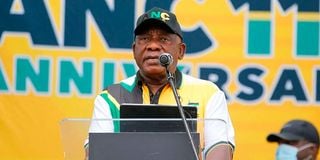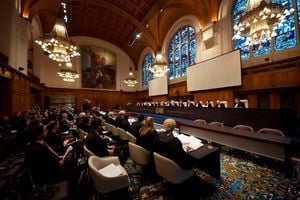
South Africa's President and African National Congress (ANC) party's President Cyril Ramaphosa speaks during the ANC's 110th anniversary celebrations at the Old Peter Mokaba Stadium in Polokwane, on January 8, 2022.
South Africa’s ruling African National Congress (ANC) made good on its decades of harsh criticism of Israel over its treatment of Palestinians with arguments to the International Court of Justice two weeks ago. But will it aid the party or become a shot in the foot politically?
Other political groups, such as Julius Malema's Economic Freedom Fighters, fully agree with the ANC and the South African government it controls in taking the Israelis to the ICJ for gross human rights violations, and for much the same reasons.
Other civil organisations and political formations have also supported the ANC's move, while some have argued that both sides are to blame in different ways – and almost all major bodies and organisations with an interest have called for at least a cessation of hostilities.

South Africa's President and African National Congress party's President Cyril Ramaphosa is assisted by other members to cut the birthday cake during the ANC's 110th anniversary celebrations at the Old Peter Mokaba Stadium in Polokwane, on January 8, 2022.
At the ICJ, South Africa made five key points; saying Israel was committing "genocide" in its ongoing drive to “eliminate Hamas.” Hamas militants operating from the Palestinian territory of Gaza are behind the brutal October 7 attacks on Israelis and others.
The war in Gaza has been a big toll. Some 24,000 civilians have died along with an unknown number of Hamas fighters, believed to be in the hundreds, as Israel attacked suspected Hamas bases with air and ground assets and thousands of invading Israeli troops.
The ANC's escalation of long-standing hostility towards Israel over its historic treatment of the Palestinians, accusing Israel of "apartheid-style policies,” is largely based on Israel's secret dealings with the former white minority regime in South Africa most countries in the world was opposed to Pretoria's systemic oppression of "non-white" South Africans.
In arguing that what Israel has done in response to the October 7 Hamas attacks, which left some 1500 dead and more than 200 abducted by militants back into Gaza, is akin to the apartheid of old, the South African lawyers at the ICJ pointed to Israel's historical and current "excesses" against Palestinians.
South Africans pointed to the deaths and injuries of many women and children – together accounting for some 70 per cent of the civilians killed in the ongoing response to the Hamas attack.
Yet there have been protests both in support of Hamas and the Palestinian cause and against it. On social media, harsh tones emerged as the latest round of the long-running conflict has escalated to unprecedented levels.
Yet, for the ANC, a downward trend of the ANC popularity has been observed here – increasingly evident during the corruption-ridden administration of former President Jacob Zuma and continuing under his successor, President Cyril Ramaphosa.
That is expected to continue when the country elects its provincial and national leadership towards the end of April.
With many issues troubling South Africans, including a high unemployment rate, there are those, including some who support the Palestinians, who say on social media and in the streets that the Ramaphosa administration should focus on solving problems at home before wading into the arena of a long-running conflict that involves others and has no clear end in sight.

In this handout photograph released by the South African Government Communication and Information System on February 20, 2018, South Africa's President Cyril Ramaphosa (right) shakes hands with his predecessor Jacob Zuma at a farewell cocktail function for President Zuma at The Presidency, Tuynhuys, Cape Town.
Peter Majolo, 43, who hails from the Eastern Cape province but who now lives and works as an entrepreneur in Cape Town, said: “Many of us understand that there has long been mistreatment by Israel of the Palestinians.
“And many understand that the Jews have been very badly treated throughout history. But that does not excuse killing thousands of women and children, even if Hamas, as the Israelis say, is hiding behind them and using them as shields.
“What Israel is doing now, after the Hamas attack, which was horrible, is just far too much. I know hardly anyone who disagrees with that – the Israelis have to solve their problems another way."
He went on to argue that the ANC sometimes does not have enough money to pay its workers. So instead of spending money on the ICJ case, the ANC should pay its workers and focus on providing services to South Africans.
“We need homes for the homeless, working and drinkable water supplies, sewage systems that do not exist where I come from, many more jobs and much less corruption," Majolo said.
“Fighting with the Jewish people over how they deal with their problems will not solve any of these problems we face here in South Africa.”
Asked whether the ICJ action by the ANC-led government would affect the vote in the next elections, Majolo said he doubted it would have much of an impact, but that it would “not help the ANC, which is struggling to retain support if some of its people are unhappy about this move. There have been and still are very senior people in the ANC who sympathise with both sides and are unhappy with the ANC taking one side against the other”.
It may not be a decisive factor in itself, but the ANC's perceived failures of governance at home will not be "swept under the carpet" simply because "the ANC has chosen to use its control of government to escalate its issues with Israel," he said.
South Africa’s ANC, as it did during apartheid, has argued Israel wants to make Gaza an unliveable zone. The fact that it was South Africa that took the matter to the ICJ was a direct result of the equivalence that the ruling party in South Africa had drawn, long before it came to power, between the attitude of white-minority South Africa towards its non-white citizens and that of Israel towards the Palestinians.
Many who had previously been on the fence about the violence between those who identify as Palestinians and the Israeli state – created by the United Nations in 1948 to provide a homeland for millions of dispossessed and displaced Jews after World War II – have been forced to take sides as the decades-long conflict has intensified.
Israel rejects such calls, including from its key ally, the US, saying it must eliminate Hamas as an organisation, find and destroy its leadership, and expose and dismantle the tunnel system Hamas has built up over years of control of Gaza.
The problem for the ANC is that a small but highly influential pro-Israeli section of the South African population is outraged that the ANC would brush aside the brutality of Hamas's October attack and focus instead on Israel's response.
With the ANC's support at a historic low and falling, amid years-long power outages with no end in sight, and reports across the country of failed and failing infrastructure and poor governance at all levels of government, compounded by widespread corruption, the ICJ's move may well further damage the ANC in the next election, due in a few months' time.
In the most recent national elections for local government, the ANC lost the overall majority of votes cast for the first time in the history of the post-apartheid movement.


